一般将来时时态用法讲解
完整版一般将来时时态用法讲解

般将来时时态1. 一般将来时的定义一般将来时表示在现在看来即将要发生的动作或存在的状态。
常用时间副词tomorrow, soon 或短语n ext year / week / mon th, in a few days, in the future, sometime 做状语。
如:What will you do this afternoon ? 你今天下午干什么?We will have a meet ing tomorrow. 我们明天要开会。
He is going to study abroad (到国外) next year.明年他要出国学习。
2. 一般将来时的结构及应用(1) shall / will + 动词原形。
表示即将发生的动作或存在的状态。
特别是表示客观性的事情或在某条件下要发生的事情,只能用此结构。
如:What shall we do if he doesn '如果他不?来,我们该怎么办?Will you be free this evenin g? 今天晚上有空吗?I think he will tell us the truth (真相)。
我想他会告诉我们真实情况的。
(2) be going to +动词原形。
表示已经计划或安排好了的事情,也可表示有迹象表明肯定要发生的事情。
如:We are going to have a meeting to discuss (讨论)the matter this evening. 今天晚上开会讨论这件事情。
Look at the black clouds over there. I think it is going to rain soon. 看一看那边的乌云,我想天要下雨了。
There is going to be an En glish evening this week. 本周要举行一个英语晚会。
(3) be +现在分词。
一般将来时时态用法讲解

⼀般将来时时态⽤法讲解⼀般将来时时态1. ⼀般将来时的定义⼀般将来时表⽰在现在看来即将要发⽣的动作或存在的状态。
常⽤时间副词tomorrow, soon或短语next year / week / month, in a few days, in the future, sometime 做状语。
如:What will you do this afternoon?你今天下午⼲什么?We will have a meeting tomorrow. 我们明天要开会。
He is going to study abroad(到国外) next year. 明年他要出国学习。
2. ⼀般将来时的结构及应⽤(1) shall / will + 动词原形。
表⽰即将发⽣的动作或存在的状态。
特别是表⽰客观性的事情或在某条件下要发⽣的事情,只能⽤此结构。
如:What shall we do if he doesn’t come 如果他不来,我们该怎么办?Will you be free this evening 今天晚上有空吗?I think he will tell us the truth(真相)。
我想他会告诉我们真实情况的。
(2) be going to + 动词原形。
表⽰已经计划或安排好了的事情,也可表⽰有迹象表明肯定要发⽣的事情。
如:We are going to have a meeting to discuss (讨论)the matter this evening. 今天晚上开会讨论这件事情。
Look at the black clouds over there. I think it is going to rain soon. 看⼀看那边的乌云,我想天要下⾬了。
There is going to be an English evening this week. 本周要举⾏⼀个英语晚会。
(3) be +现在分词。
时态详解:一般将来时
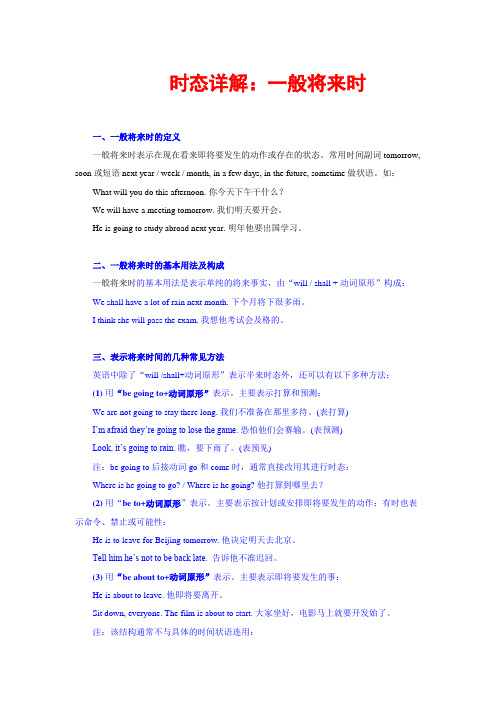
时态详解:一般将来时一、一般将来时的定义一般将来时表示在现在看来即将要发生的动作或存在的状态。
常用时间副词tomorrow, soon或短语next year / week / month, in a few days, in the future, sometime 做状语。
如:What will you do this afternoon. 你今天下午干什么?We will have a meeting tomorrow. 我们明天要开会。
He is going to study abroad next year. 明年他要出国学习。
二、一般将来时的基本用法及构成一般将来时的基本用法是表示单纯的将来事实,由“will / shall + 动词原形”构成:We shall have a lot of rain next month. 下个月将下很多雨。
I think she will pass the exam. 我想他考试会及格的。
三、表示将来时间的几种常见方法英语中除了“will /shall+动词原形”表示半来时态外,还可以有以下多种方法:(1)用“be going to+动词原形”表示。
主要表示打算和预测:We are not going to stay there long. 我们不准备在那里多待。
(表打算)I’m afraid they’re going to lose the game.恐怕他们会赛输。
(表预测)Look, it’s going to rain.瞧,要下雨了。
(表预见)注:be going to 后接动词go和come时,通常直接改用其进行时态:Where is he going to go? / Where is he going? 他打算到哪里去?(2)用“be to+动词原形”表示。
主要表示按计划或安排即将要发生的动作;有时也表示命令、禁止或可能性:He is to leave for Beijing tomorrow. 他决定明天去北京。
一般将来时态用法

一般将来时态用法一般将来时表示在将来某个时间要发生的动作或存在的状态。
一. 一般将来时的基本用法:表示“纯粹的将来”:①表示将要发生的动作或情况,常带有表示将来的时间状语,如tomorrow, next week, in two days, from now on 等。
如:It will be fine tomorrow. 明天天气晴朗。
②表示预料将要发生的动作或情况。
如:You will feel better after having this medicine. 吃了这药,你就会感觉好些的。
二. 一般将来时的构成:1. 由助动词“ shall/ will +动词原形”构成,shall 用于第一人称,will 用于第二、第三人称,而美式英语在陈述句中无论什么人称,一律用will. 表示“带有情态意义的将来”,用来表示意图,用will 来表示。
如:I will be more careful next time. 下次我要更加小心。
I won't go shopping this afternoon, but she will. 今天下午我不想去购物,但她想去。
2. will 在疑问句中,用来表示有礼貌地征询对方的意见。
如:Will you have some more tea 要不要再喝点茶What shall we do this weekend 本周末我们要干什么3. 一般将来时的否定和疑问形式:一般将来时的否定形式是will not ,缩写为won't; shall not ,缩写为shan't 。
一般将来时的疑问形式是把will/ shall 提到主语前。
如:He won’t go to th e park this Sunday. 本周日他不去公园。
Will you go swimming with me 和我一起去游泳好吗4. shall只用于第一人称,如用于第二、第三人称,就失去助动词的意义,已变为情态动词,试比较: He shall come. 他必须来。
时态一般将来时
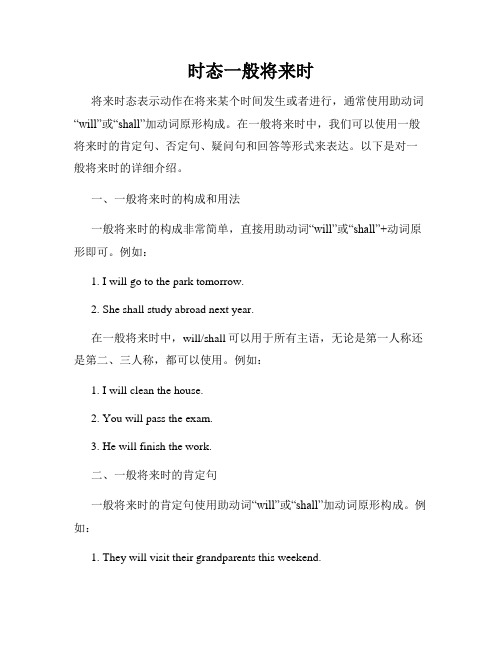
时态一般将来时将来时态表示动作在将来某个时间发生或者进行,通常使用助动词“will”或“shall”加动词原形构成。
在一般将来时中,我们可以使用一般将来时的肯定句、否定句、疑问句和回答等形式来表达。
以下是对一般将来时的详细介绍。
一、一般将来时的构成和用法一般将来时的构成非常简单,直接用助动词“will”或“shall”+动词原形即可。
例如:1. I will go to the park tomorrow.2. She shall study abroad next year.在一般将来时中,will/shall可以用于所有主语,无论是第一人称还是第二、三人称,都可以使用。
例如:1. I will clean the house.2. You will pass the exam.3. He will finish the work.二、一般将来时的肯定句一般将来时的肯定句使用助动词“will”或“shall”加动词原形构成。
例如:1. They will visit their grandparents this weekend.2. We shall have a party to celebrate.三、一般将来时的否定句一般将来时的否定句在助动词“will”或“shall”后面加上“not”,形成“will not”或“shall not”。
例如:1. She will not go to the concert.2. We shall not be late for the meeting.四、一般将来时的疑问句一般将来时的疑问句是将助动词“will”或“shall”提到主语之前。
例如:1. Will you join us for dinner?2. Shall we go to the cinema together?五、一般将来时的答案在一般将来时的疑问句中,肯定回答用"Yes, 主语 + will/shall"的形式,否定回答用"No, 主语 + will/shall not"的形式。
一般将来时态讲解(共25张PPT)

• I don't think the test will be very difficult. 。
②用于“祈使句 + and + 陈述句” 中
I don’t think it will rain this afternoon.
I am hungry. I think I’ll have something to eat.
表示看法,观点
“There be”句型的一般将来时 肯定句: There will be +名词+其他成份 [注意]:无论后面加单数名词或复数形式,be都必须用原形。
shall适用于第一人称I,We;而will适用于所有人称。 通常可以用will来代替shall。 will,shall均可缩写为:'ll,如:
I will= I'll; she will = she’ll;will not 和shall not分别可以 缩写为 won't 和shan't。
1.一般将来时的用法
4. be about to + 动词原形。 表示 (1)“即将做”或“马上做”
(2)因此,句子不能再用时间状语。
Don’t leave. Li Lei is about to come. 不要走了,李蕾就要来了。 Be quiet. The concert is about to start. 安静下来,音乐演唱会就要开始了。
• My uncle will come to see me every Saturday.
• 我叔叔每个星期六都会来看我。
• The students will have five English classes per week this term.
初二英语语法分析--一般将来时用法讲解
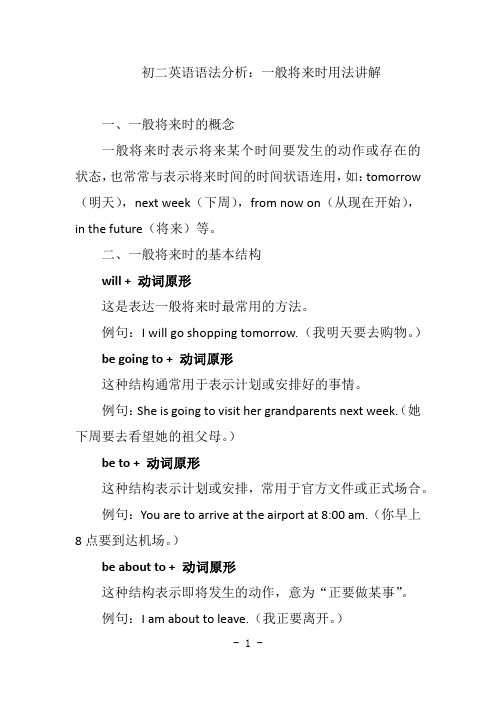
初二英语语法分析:一般将来时用法讲解一、一般将来时的概念一般将来时表示将来某个时间要发生的动作或存在的状态,也常常与表示将来时间的时间状语连用,如:tomorrow (明天),next week(下周),from now on(从现在开始),in the future(将来)等。
二、一般将来时的基本结构will + 动词原形这是表达一般将来时最常用的方法。
例句:I will go shopping tomorrow.(我明天要去购物。
)be going to + 动词原形这种结构通常用于表示计划或安排好的事情。
例句:She is going to visit her grandparents next week.(她下周要去看望她的祖父母。
)be to + 动词原形这种结构表示计划或安排,常用于官方文件或正式场合。
例句:You are to arrive at the airport at 8:00 am.(你早上8点要到达机场。
)be about to + 动词原形这种结构表示即将发生的动作,意为“正要做某事”。
例句:I am about to leave.(我正要离开。
)be due to + 动词原形这种结构表示某事预定或预期将要发生。
例句:The train is due to arrive at 5:00 pm.(火车预定下午5点到达。
)三、一般将来时的用法1表示将来的动作或状态例句:I will buy a new car next year.(明年我要买一辆新车。
)2表示将来的计划或安排例句:We are going to have a picnic this weekend.(我们这个周末要去野餐。
)3表示根据现有情况推测未来的可能性例句:It's going to rain soon.(很快就要下雨了。
)4表示命令、请求、建议等例句:You are to finish your homework before you go out.(你出去之前要把作业做完。
动词时态一般将来时的用法

动词时态一般将来时的用法动词时态包含了多种不同的形式,每种形式都传达了特定的时间信息。
在英语中,一般将来时是用来表达将来发生的动作、事件或状态的。
本文将详细介绍一般将来时的用法,并提供一些例句来帮助读者更好地理解。
一、一般将来时的定义一般将来时是用来表达明确的将来发生的动作或状态。
通常使用的助动词是will或shall,根据主语的不同而定。
二、一般将来时的构成1. 肯定句结构:主语 + will + 动词原形例如:- I will go shopping tomorrow.- He will travel to Europe next week.2. 否定句结构:主语 + will + not + 动词原形,或主语 + won't + 动词原形例如:- She will not visit her grandparents this weekend.- They won't attend the party.3. 疑问句结构:Will + 主语 + 动词原形?例如:- Will you join us for dinner?- Will they arrive on time?三、一般将来时的用法1. 表达自愿或意愿一般将来时常常用来表达主观上的决定、打算或愿望。
例如:- I will help you with your project.- He will volunteer at the local charity organization.2. 表示未来的计划或安排一般将来时可用于描述预定的时间表或安排。
例如:- We will have a meeting at 9am tomorrow.- They will arrive at the airport in the evening.3. 表示预测或推测有时,我们可以根据现有的证据或情况,使用一般将来时来推测未来可能发生的事情。
一般将来时态讲解
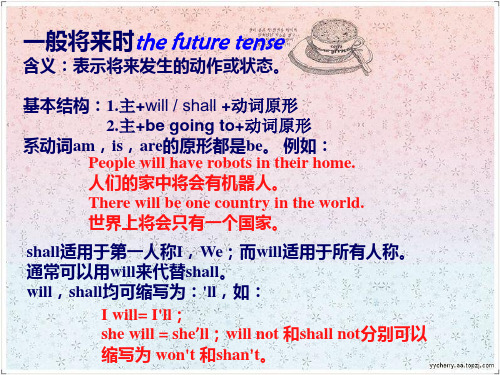
will
说话人认为、相信、希望或假定要发生 的事,不含任何具体的时间,可以指遥 远的未来。 I believe China will become one of the richest countries in the world.
be going to
有迹象表明某事即将发生或肯定会发生, 通常表示很快就要发生的事情。 There is going to be a quarrel between them, I think.
• • • • • • •
Is there a film tonight? 今晚有电影吗? I write my paper tomorrow. Tomorrow is Christmas Day. When does the ship sail? She retires next month. How long does he stay? The plane takes off at eight and arrives in Beijing at eleven.
1.一般将来时的用法
• ①表示将来某一时间将要发生的动作或 存在的状态, I shall be free this afternoon. • There'll be no chemistry classes tomorrow. • They will probably go to Shanghai for their holiday. • 注意:在口语中,常用will / shall + be doing结构来代替will / shall + 动词原形, 以表示生动。 • I‘ll be seeing a friend off at the airport. • He'll be going with us tomorrow.
一般将来时的使用方法是什么
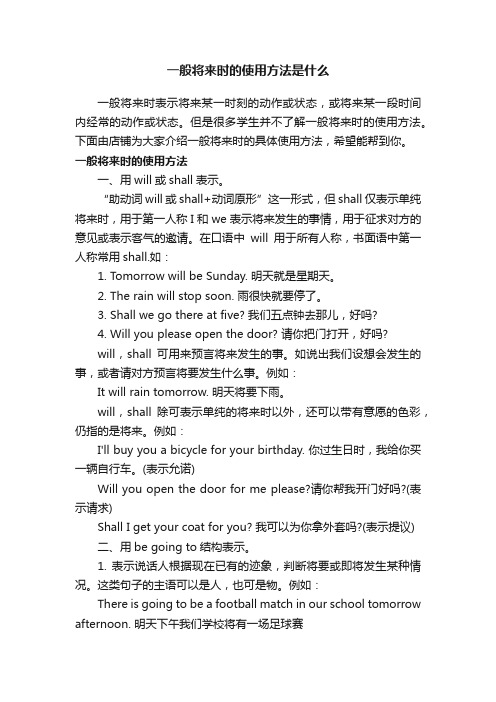
一般将来时的使用方法是什么一般将来时表示将来某一时刻的动作或状态,或将来某一段时间内经常的动作或状态。
但是很多学生并不了解一般将来时的使用方法。
下面由店铺为大家介绍一般将来时的具体使用方法,希望能帮到你。
一般将来时的使用方法一、用will或shall表示。
“助动词will或shall+动词原形”这一形式,但shall 仅表示单纯将来时,用于第一人称I和we表示将来发生的事情,用于征求对方的意见或表示客气的邀请。
在口语中will用于所有人称,书面语中第一人称常用shall.如:1. Tomorrow will be Sunday. 明天就是星期天。
2. The rain will stop soon. 雨很快就要停了。
3. Shall we go there at five? 我们五点钟去那儿,好吗?4. Will you please open the door? 请你把门打开,好吗?will,shall可用来预言将来发生的事。
如说出我们设想会发生的事,或者请对方预言将要发生什么事。
例如:It will rain tomorrow. 明天将要下雨。
will,shall除可表示单纯的将来时以外,还可以带有意愿的色彩,仍指的是将来。
例如:I'll buy you a bicycle for your birthday. 你过生日时,我给你买一辆自行车。
(表示允诺)Will you open the door for me please?请你帮我开门好吗?(表示请求)Shall I get your coat for you? 我可以为你拿外套吗?(表示提议)二、用be going to结构表示。
1. 表示说话人根据现在已有的迹象,判断将要或即将发生某种情况。
这类句子的主语可以是人,也可是物。
例如:There is going to be a football match in our school tomorrow afternoon. 明天下午我们学校将有一场足球赛(已有告示)I feel terrible.I think I'm going to die. 我感到难受极了,我想我快不行了。
关于英语一般将来时的用法
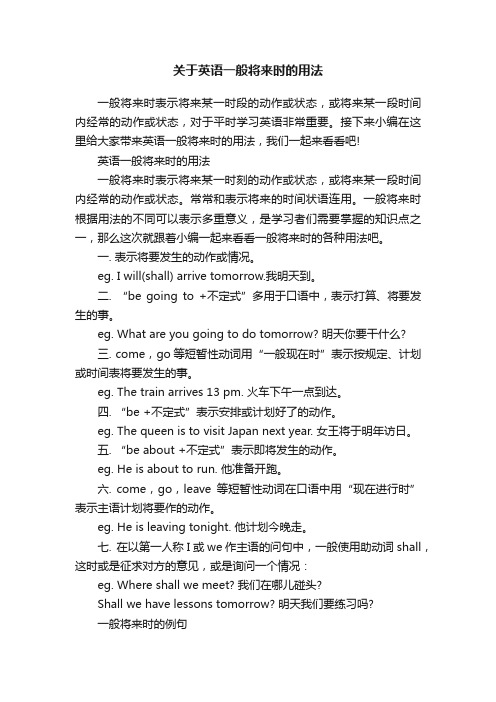
关于英语一般将来时的用法一般将来时表示将来某一时段的动作或状态,或将来某一段时间内经常的动作或状态,对于平时学习英语非常重要。
接下来小编在这里给大家带来英语一般将来时的用法,我们一起来看看吧!英语一般将来时的用法一般将来时表示将来某一时刻的动作或状态,或将来某一段时间内经常的动作或状态。
常常和表示将来的时间状语连用。
一般将来时根据用法的不同可以表示多重意义,是学习者们需要掌握的知识点之一,那么这次就跟着小编一起来看看一般将来时的各种用法吧。
一. 表示将要发生的动作或情况。
eg. I will(shall) arrive tomorrow.我明天到。
二. “be going to +不定式”多用于口语中,表示打算、将要发生的事。
eg. What are you going to do tomorrow? 明天你要干什么?三. come,go等短暂性动词用“一般现在时”表示按规定、计划或时间表将要发生的事。
eg. The train arrives 13 pm. 火车下午一点到达。
四. “be +不定式”表示安排或计划好了的动作。
eg. The queen is to visit Japan next year. 女王将于明年访日。
五. “be about +不定式”表示即将发生的动作。
eg. He is about to run. 他准备开跑。
六. come,go,leave等短暂性动词在口语中用“现在进行时”表示主语计划将要作的动作。
eg. He is leaving tonight. 他计划今晚走。
七. 在以第一人称I或we作主语的问句中,一般使用助动词shall,这时或是征求对方的意见,或是询问一个情况:eg. Where shall we meet? 我们在哪儿碰头?Shall we have lessons tomorrow? 明天我们要练习吗?一般将来时的例句1、He will get married. 他就快结婚了。
一般将来时态的基本用法-运用方法-有哪些用法
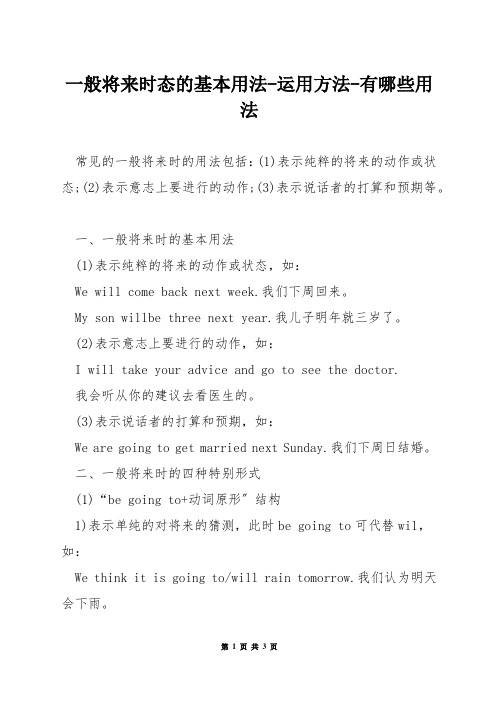
一般将来时态的基本用法-运用方法-有哪些用法常见的一般将来时的用法包括:(1)表示纯粹的将来的动作或状态;(2)表示意志上要进行的动作;(3)表示说话者的打算和预期等。
一、一般将来时的基本用法(1)表示纯粹的将来的动作或状态,如:We will come back next week.我们下周回来。
My son willbe three next year.我儿子明年就三岁了。
(2)表示意志上要进行的动作,如:I will take your advice and go to see the doctor.我会听从你的建议去看医生的。
(3)表示说话者的打算和预期,如:We are going to get married next Sunday.我们下周日结婚。
二、一般将来时的四种特别形式(1)“be going to+动词原形〞结构1)表示单纯的对将来的猜测,此时be going to可代替wil,如:We think it is going to/will rain tomorrow.我们认为明天会下雨。
2)表示说话者对将来有依据的猜测,如:Look at those black clouds!It's going to rain.看那些乌云!要下雨了。
3)表示说话者深思熟虑后的打算,如:He is going to be a teacher when he grows up.他长大后要当老师。
(2)“be to+动词原形〞结构,表示按计划将要进行的动作或征求对方看法,如:My son is to go to school tomorrow.我儿子明天要去上学。
Are we to discuss about this project?我们要讨论这个项目吗?(3)“be about to+动词原形〞结构,表示马上发生的动作,如: We are about to leave.我们正要离开。
一般将来时语法知识讲解
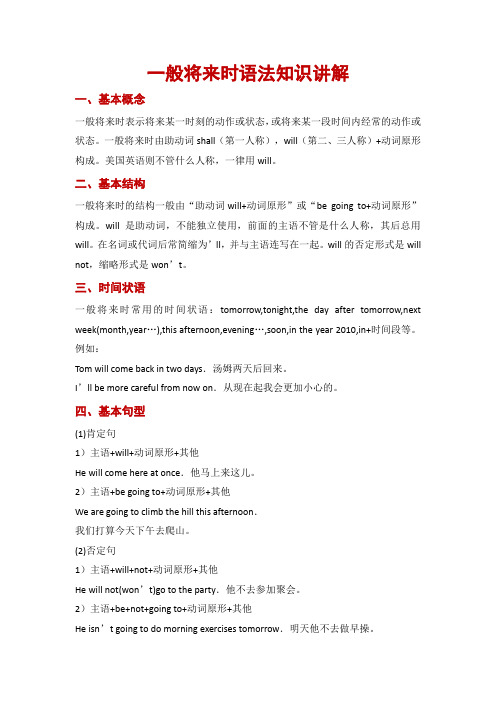
一般将来时语法知识讲解一、基本概念一般将来时表示将来某一时刻的动作或状态,或将来某一段时间内经常的动作或状态。
一般将来时由助动词shall(第一人称),will(第二、三人称)+动词原形构成。
美国英语则不管什么人称,一律用will。
二、基本结构一般将来时的结构一般由“助动词will+动词原形”或“be going to+动词原形”构成。
will是助动词,不能独立使用,前面的主语不管是什么人称,其后总用will。
在名词或代词后常简缩为’ll,并与主语连写在一起。
will的否定形式是will not,缩略形式是won’t。
三、时间状语一般将来时常用的时间状语:tomorrow,tonight,the day after tomorrow,next week(month,year…),this afternoon,evening…,soon,in the year 2010,in+时间段等。
例如:Tom will come back in two days.汤姆两天后回来。
I’ll be more careful from now on.从现在起我会更加小心的。
四、基本句型(1)肯定句1)主语+will+动词原形+其他He will come here at once.他马上来这儿。
2)主语+be going to+动词原形+其他We are going to climb the hill this afternoon.我们打算今天下午去爬山。
(2)否定句1)主语+will+not+动词原形+其他He will not(won’t)go to the party.他不去参加聚会。
2)主语+be+not+going to+动词原形+其他He isn’t going to do morning exercises tomorrow.明天他不去做早操。
(3)一般疑问句1)Will+主语+动词原形+其他?Will he help you with your English?他会帮助你学习英语吗?2)Be动词(Am,Is,Are)+主语+going to+动词原形+其他?Are you going to play computer games tomorrow afternoon?你打算明天下午玩电脑游戏吗?(4)特殊疑问句:疑问词+一般疑问句?—What will the students have for lunch today?学生们今天午饭吃什么?—They will have bread.他们将吃面包。
(完整版)一般将来时时态用法讲解
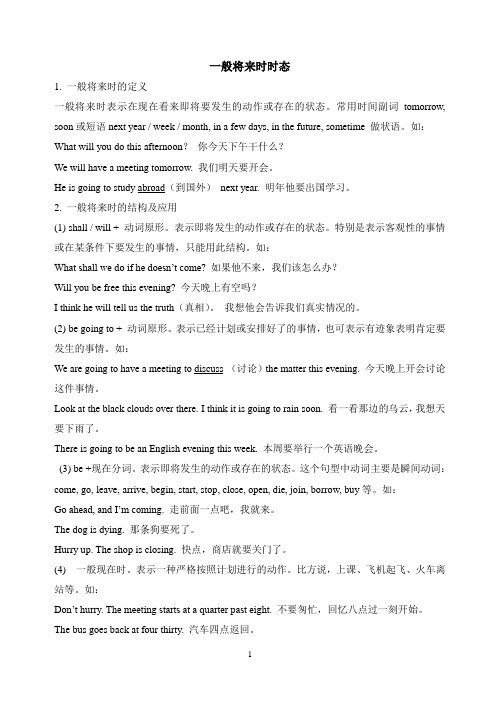
一般将来时时态1. 一般将来时的定义一般将来时表示在现在看来即将要发生的动作或存在的状态。
常用时间副词tomorrow, soon或短语next year / week / month, in a few days, in the future, sometime 做状语。
如:What will you do this afternoon?你今天下午干什么?We will have a meeting tomorrow. 我们明天要开会。
He is going to study abroad(到国外)next year. 明年他要出国学习。
2. 一般将来时的结构及应用(1) shall / will + 动词原形。
表示即将发生的动作或存在的状态。
特别是表示客观性的事情或在某条件下要发生的事情,只能用此结构。
如:What shall we do if he doesn’t come? 如果他不来,我们该怎么办?Will you be free this evening? 今天晚上有空吗?I think he will tell us the truth(真相)。
我想他会告诉我们真实情况的。
(2) be going to + 动词原形。
表示已经计划或安排好了的事情,也可表示有迹象表明肯定要发生的事情。
如:We are going to have a meeting to discuss (讨论)the matter this evening. 今天晚上开会讨论这件事情。
Look at the black clouds over there. I think it is going to rain soon. 看一看那边的乌云,我想天要下雨了。
There is going to be an English evening this week. 本周要举行一个英语晚会。
(3) be +现在分词。
表示即将发生的动作或存在的状态。
一般将来时的用法

一般将来时的用法一般将来时(Simple Future Tense)是描述将来发生的事情或计划的一种时态。
在英语中,一般将来时的构成方式比较简单,一般使用助动词“will”或“be going to”来表示将来时态。
除了这两种方式外,还有其他一些用法和注意事项。
本文将详细介绍一般将来时的用法。
一、will的用法1. 表示意愿或决定:我们可以使用will表示即时决定或表示意愿。
例如:- I am thirsty. I will get some water.(我口渴了。
我要去倒些水。
)- He doesn't have a car, so I will lend him mine.(他没有车,所以我会借给他我的车。
)2. 表示预测或推测:will可用来表达对未来情况的推测或预测。
例如:- It's getting cloudy. I think it will rain soon.(天开始多云了。
我觉得很快就会下雨。
)- She is such a talented musician. I'm sure she will become famous one day.(她是一个非常有才华的音乐家。
我相信她总有一天会出名的。
)3. 提供承诺或请求:will也可以用来表示承诺或请求。
例如:- I will definitely help you with your project.(我一定会帮你完成你的项目。
)- Will you please pass me the salt?(请你把盐递给我好吗?)二、be going to的用法1. 表示计划或打算:be going to可以用来表示我们已经有了计划或打算要做某事。
例如:- I am going to visit my parents this weekend.(我打算这个周末去看望我的父母。
)- They are going to open a new restaurant in town.(他们打算在城里开一家新餐厅。
一般将来时的构造和用法

一般将来时的构造和用法一般将来时是英语中表示将来发生的动作或事件的时态。
它用来描述将来某一时间或情况下预计会发生的事情。
一般将来时的构造和用法有以下几种。
1. 肯定句结构:主语 + will + 动词原形 + 其他2. 否定句结构:主语 + will + not + 动词原形 + 其他3. 一般疑问句结构:Will + 主语 + 动词原形 + 其他?4. 特殊疑问句结构:特殊疑问词 + will + 主语 + 动词原形 + 其他?下面将分别对这些句子结构进行详细解释和示例。
1. 肯定句结构:主语 + will + 动词原形 + 其他肯定句结构用于表达预测、打算、意愿和承诺等将来发生的动作或事件。
以下是一些例句:- I will go shopping tomorrow.(我明天会去购物。
)- They will visit their grandparents next week.(他们下周会去拜访他们的祖父母。
)- She will study abroad next year.(她明年会出国留学。
)2. 否定句结构:主语 + will + not + 动词原形 + 其他否定句结构表示将来某一时间或情况下不会发生的动作或事件。
以下是一些例句:- He will not attend the meeting tomorrow.(他明天不会参加会议。
)- We will not travel to Europe next summer.(我们下个夏天不会去欧洲旅行。
)- The party will not start until 8 p.m.(晚会直到晚上8点才开始。
)3. 一般疑问句结构:Will + 主语 + 动词原形 + 其他?一般疑问句结构用来询问预测、打算、意愿和承诺等将来发生的动作或事件是否会发生。
以下是一些例句:- Will you attend the conference tomorrow?(你明天会参加会议吗?)- Will they come to our party this weekend?(他们这个周末会来我们的派对吗?)- Will she finish her project on time?(她会按时完成她的项目吗?)4. 特殊疑问句结构:特殊疑问词 + will + 主语 + 动词原形 + 其他?特殊疑问句结构用来询问关于将来动作或事件的特定信息。
一般将来时态的结构和用法
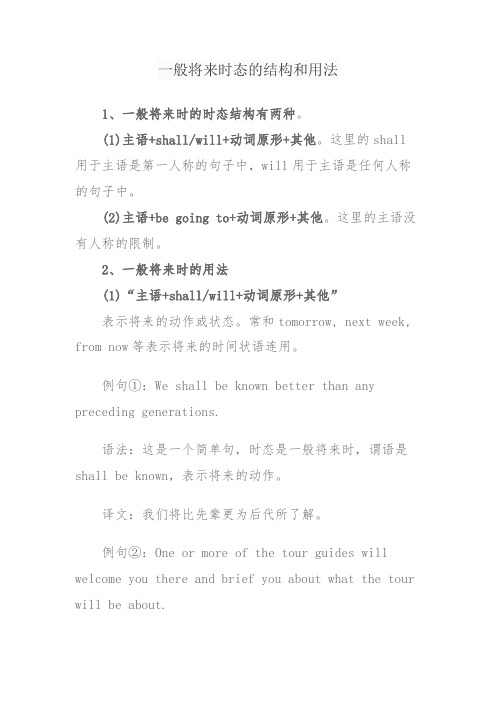
一般将来时态的结构和用法1、一般将来时的时态结构有两种。
(1)主语+shall/will+动词原形+其他。
这里的shall 用于主语是第一人称的句子中,will用于主语是任何人称的句子中。
(2)主语+be going to+动词原形+其他。
这里的主语没有人称的限制。
2、一般将来时的用法(1)“主语+shall/will+动词原形+其他”表示将来的动作或状态。
常和tomorrow, next week, from now等表示将来的时间状语连用。
例句①:We shall be known better than any preceding generations.语法:这是一个简单句,时态是一般将来时,谓语是shall be known,表示将来的动作。
译文:我们将比先辈更为后代所了解。
例句②:One or more of the tour guides will welcome you there and brief you about what the tour will be about.语法:这是一个主从复合句。
what引导的是宾语从句;主句和从句的时态都是一般将来时,谓语分别是will welcome…and brief和will be,表示将来的动作。
译文:有一个或几个导游会到那里迎接你们,并且向你们简要介绍参观的内容。
(2)“be going to+动词原形+其他”表示事先考虑过的将要发生的动作以及已有迹象表明必将要发生的某事,意为“打算,就要”。
例句:Now we go to Jane who is going to tell us about what's happening in town this weekend.语法:这是一个多重主从复合句。
who引导的是定语从句,该从句的时态是一般将来时,谓语是is going to tell;该定语从句中又包含一个由what引导的宾语从句,作介词about的宾语。
一般将来时知识点总结讲解学习

一般将来时知识点总结讲解学习一般将来时是英语语法中的一种时态,用于表示将来一些时间将会发生的动作或状态。
它常常与表示将来的时间状语连用,如tomorrow(明天)、next week(下周)、in the future(将来)等。
下面是一般将来时的知识点总结和讲解。
一、一般将来时的构成1. 肯定句结构:主语 + will + 动词原形例如:I will go to the park tomorrow.2. 否定句结构:主语 + will not(won't)+ 动词原形例如:She won't watch TV tonight.3. 疑问句结构:Will + 主语 + 动词原形 + 其他?例如:Will you have dinner with us?二、一般将来时的用法1.表示将来的计划、打算或意图例如:They will visit their grandparents next month.2.表示预测、推测或猜测例如:I think it will rain tomorrow.3.表示请求、邀请、建议或命令例如:Will you please pass me the salt?4.表示承诺、威胁或警告例如:I will help you with the project.5.在主句中的时间状语从句中,一般将来时常常用于表示将来的动作或状态。
例如:I will go shopping when I finish my work.三、一般将来时的注意事项1.一般将来时表示先于现在或过去的将来动作或状态,与现在的决定或打算无关。
例如:I will study abroad next year. (现在决定)2. be动词的一般将来时构成为will be,否定形式为will not be (won't be)。
例如:He will be at home tomorrow.3.一般将来时常常与表示将来的时间状语连用。
一般将来时的用法
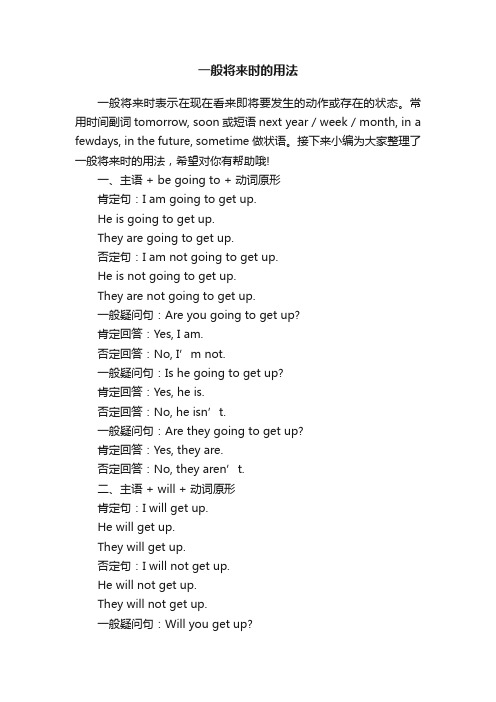
一般将来时的用法一般将来时表示在现在看来即将要发生的动作或存在的状态。
常用时间副词tomorrow, soon或短语next year / week / month, in a fewdays, in the future, sometime 做状语。
接下来小编为大家整理了一般将来时的用法,希望对你有帮助哦!一、主语 + be going to + 动词原形肯定句:I am going to get up.He is going to get up.They are going to get up.否定句:I am not going to get up.He is not going to get up.They are not going to get up.一般疑问句:Are you going to get up?肯定回答:Yes, I am.否定回答:No, I’m not.一般疑问句:Is he going to get up?肯定回答:Yes, he is.否定回答:No, he isn’t.一般疑问句:Are they going to get up?肯定回答:Yes, they are.否定回答:No, they aren’t.二、主语 + will + 动词原形肯定句:I will get up.He will get up.They will get up.否定句:I will not get up.He will not get up.They will not get up.一般疑问句:Will you get up?肯定回答:Yes, I will.否定回答:No, I won’t.一般疑问句:Will he get up.肯定回答:Yes, he will.否定回答:No, he won’t.一般疑问句:Are they going to get up?肯定回答:Yes, they are.否定回答:No, they aren’t.一般将来时/式(The Simple Future tense)时态定义be going to表主观的打算shall和will常常缩写成'll ,紧接在主语之后。
一般将来时的结构和用法及讲解
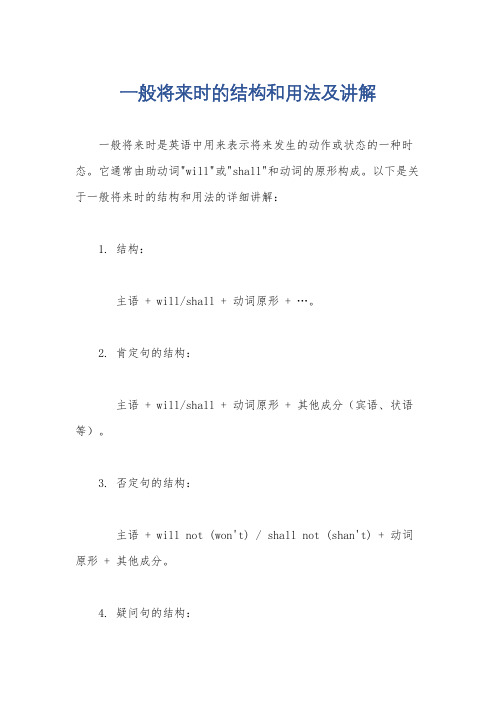
一般将来时的结构和用法及讲解一般将来时是英语中用来表示将来发生的动作或状态的一种时态。
它通常由助动词"will"或"shall"和动词的原形构成。
以下是关于一般将来时的结构和用法的详细讲解:1. 结构:主语 + will/shall + 动词原形+ …。
2. 肯定句的结构:主语 + will/shall + 动词原形 + 其他成分(宾语、状语等)。
3. 否定句的结构:主语 + will not (won't) / shall not (shan't) + 动词原形 + 其他成分。
4. 疑问句的结构:Will/Shall + 主语 + 动词原形 + 其他成分?5. 用法:a. 表示未来的事实、计划或意图,例如,“I will call you later.”(我稍后会给你打电话。
)。
b. 表示预测或假设,例如,“It will rain tomorrow.”(明天会下雨。
)。
c. 表示意愿、请求或承诺,例如,“I will help you with your homework.”(我会帮你做作业。
)。
d. 表示决定,例如,“I will buy a new car.”(我决定买辆新车。
)。
一般将来时的用法相对灵活,可以根据语境和需要进行灵活运用。
需要注意的是,一般将来时中的助动词"will"在口语中常缩写为"‘ll",而否定形式则缩写为"won't"。
同时,在一般将来时中,shall通常用于第一人称(I 和 we),而will则用于其他人称。
在现代英语中,shall的使用已经相对较少,通常用will来表示一般将来时。
- 1、下载文档前请自行甄别文档内容的完整性,平台不提供额外的编辑、内容补充、找答案等附加服务。
- 2、"仅部分预览"的文档,不可在线预览部分如存在完整性等问题,可反馈申请退款(可完整预览的文档不适用该条件!)。
- 3、如文档侵犯您的权益,请联系客服反馈,我们会尽快为您处理(人工客服工作时间:9:00-18:30)。
一般将来时时态1. 一般将来时的定义一般将来时表示在现在看来即将要发生的动作或存在的状态。
常用时间副词tomorrow, soon 或短语next year / week / month, in a few days, in the future, sometime 做状语。
如:What will you do this afternoon?你今天下午干什么?We will have a meeting tomorrow. 我们明天要开会。
He is going to study abroad(到国外) next year. 明年他要出国学习。
2. 一般将来时的结构及应用(1) shall / will + 动词原形。
表示即将发生的动作或存在的状态。
特别是表示客观性的事情或在某条件下要发生的事情,只能用此结构。
如:What shall we do if he doesn’t come 如果他不来,我们该怎么办?Will you be free this evening 今天晚上有空吗?I think he will tell us the truth(真相)。
我想他会告诉我们真实情况的。
(2) be going to + 动词原形。
表示已经计划或安排好了的事情,也可表示有迹象表明肯定要发生的事情。
如:We are going to have a meeting to discuss (讨论)the matter this evening. 今天晚上开会讨论这件事情。
Look at the black clouds over there. I think it is going to rain soon. 看一看那边的乌云,我想天要下雨了。
There is going to be an English evening this week. 本周要举行一个英语晚会。
(3) be +现在分词。
表示即将发生的动作或存在的状态。
这个句型中动词主要是瞬间动词:come, go, leave, arrive, begin, start, stop, close, open, die, join, borrow, buy 等。
如:Go ahead, and I’m coming. 走前面一点吧,我就来。
The dog is dying. 那条狗要死了。
Hurry up. The shop is closing. 快点,商店就要关门了。
(4) 一般现在时。
表示一种严格按照计划进行的动作。
比方说,上课、飞机起飞、火车离站等。
如:Don’t hurry. The meeting starts at a quarter past eight. 不要匆忙,回忆八点过一刻开始。
The bus goes back at four thirty. 汽车四点返回。
巩固练习:一、用所给动词的适当形式填空1.Li Lei tells me he _________________(visit)the Great Wall(长城)this weekend.2.My mother _________________(buy)me a pair of new trousers tomorrow.3.She says she _________________(leave)soon.4.We _________________(go) skating if it doesn’t rain next Sunday.5.There _________________(be)an English evening next week.6.Think over, and you _________________(get)a good idea.7.——___________Jim ___________(have)a picnic next Monday——-No, he __________.8.I _________________(miss)you after you leave here.9.Who _________________(teach)you English next year10.He _________________ (be) back in three hours.11.Look at these clouds. It ___________________ (rain).二、改错:每处划线中有错误,在题后改正1.He will sing anddancesfor us tomorrow.2.Are you going to swim ------Yes, Iwill.3.He will help Jim with his Englishevery day.4.Will her sistersingsa song for me tomorrow5.They willn’t plant trees next week.6.Are they going toplaysbasketball tomorrow7.Willwe go to visit the factory tomorrow8.Paulwill be going tomake dumplings for Emma.9.Are the boys going to the Great Wall next month ------Yes, theywill.三、句型转换:Jimis going to play footballtomorrow.Marywill clean the windowsnext week.否定句:____________________________ ______________________________一般疑问句:_____________________________ ______________________________两回答:___________________________ _____________________________特殊疑问句:______________________ _____________________________四、选择题( )1. —Are you going to _______ our English team—Yes, I am.A. take part inB. joinC. took part inD. joined( )2. Xu Xia and her teammates are _______ the USA next week.A. leaving forB. leave forC. leaveD. left( )3. There _______ an English party in our class next week.A. is going to haveB. is going to beC. will haveD. Have( ) 4. If it _______ tomorrow, we will go to the park.A. isn’t rainB. don’t rainC. doesn’t rainD. won’t rain( )5. There ______ a football match next week. Shall we go and watch itA. will haveB. hasC. haveD. will be“Would you mind doing…”句型透视mind用作动词时,习惯后接动名词(短语)作宾语,而不接动词不定式,常用于Would you mind doing…?句型中,具体用法是:1. “Would you mind doing…?”句型常用于表示请求,意思是“请你做……你是否介意?、请你做……好吗?”,是一种比较客气的表达方式。
如:Would you mind turning off the light in the room?请你把房间里的灯关掉好吗?如果要表示“请你不要做……你是否介意?、请你不要做……好吗?”,只需要在doing 前面加上not.如:Would you mind not standing in front of me?请你不要站在我的前面好吗?2. 如果同意,表示不介意时,可用如下用语来表达:Certainly/Of course not./Not at all./No, not at all;如果不同意,表示介意时,常用“Sorry/I‘m sorry.”(对不起)及陈述某种理由来表示拒绝或反对。
如:—Would you mind going to the movies this evening?今晚去看电影好吗?—I‘m sorry. But I haven’t finished my homework yet.对不起,我的作业还没有完成。
学习时还要注意:1.“Would you mind doing…?”句型中的would也可用do代替,但语气较生硬,不如用would客气。
2.“Would you mind doing…?”句型中的逻辑主语只能是谈话的对方you.如果想要对方允许自己做某事,可用“Would you mind my doing…?”句型,如:Would you mind my smoking here?你介意我在这里吸烟吗?巩固练习:一、用下面提供的短语完成句子。
1. help me wash my clothesWould you mind ______________________________?2. give her a cup of teaWould you mind _______________________________?3. help him mend his carDo you have _______________________________?4. walk on the roadWould you mind _______________________________ on the road?二、选择题( )1. —Would you mind _______ us in the game—Not at all.A. joiningB. joinC. join inD. joining in( )2. —Would you like to climb mountains with me this Sunday—I’d love to. But I _______ play table tennis against Class Three.A. am goingB. am going toC. amD. going to( )3. —Would you mind _______here—I’m sorry about that. I’ll go somewhere else.A. no smokingB. not smokingC. no smokeD. not smoke1. had better 的基本用法特点其意为“最好”、“应该”,后接动词原形,与情态动词should用法相似,其中的had通常缩略为’d:You’d better get some sleep.你最好去睡一会儿。
